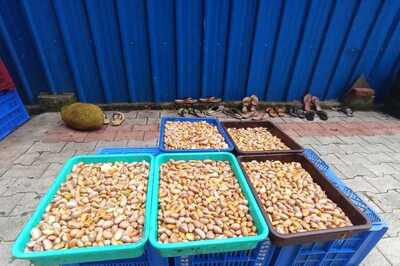
views
Houston: US space agency National Aeronautics and Space Administration (NASA) has announced the launch date for the first test flight of a commercial spacecraft to the International Space Station (ISS).
The mission, which will test a vehicle intended to carry cargo and eventually crew to orbit represents an important step for the burgeoning private space industry, experts say.
SpaceX is going to send its unmanned space capsule Dragon to rendezvous with the International Space Station (ISS) on February 7 next year.
This will be the first time that NASA would use a commercial flight to ferry supplies up to the ISS.
Elon Musk s company, SpaceX, has been approved by NASA to make its first commercial supply run to the ISS. SpaceX has been working on its Dragon "reusable flying aircraft" to get it ready for its first big supply run.
"SpaceX is excited to be the first commercial company in history to berth with the International Space Station," the
company's president Gwynne Shotwell said in a statement.
"This mission will mark a historic milestone in the future of spaceflight. We appreciate NASA's continued support and their partnership in this process."
This flight, which is the second for the company under NASA's Commercial Orbital Transportation Services (COTS)
program, will send the Dragon capsule into orbit to rendezvous with the orbiting complex in a single flight, NASA officials said.
"SpaceX has made incredible progress over the last several months preparing Dragon for its mission to the space station," William Gerstenmaier, NASA's associate administrator for the Human Exploration and Operations Mission Directorate said in a statement.
"We look forward to a successful mission, which will open up a new era in commercial cargo delivery for this international orbiting laboratory," the statement said.
The Dragon aircraft is an unmanned delivery vehicle that can be used to deliver pressurised and unpressurised cargo as well as crew members to the ISS. It has the capability of fully autonomous docking with the ISS and it can be manually docked if it is carrying crew members.
SpaceX has a USD 1.6 billion contract with NASA for 12 flights as part of NASA s Commercial Orbital Transportation Services (COTS) program. After those 12 flights, the contract can be extended.
February's flight is expected to perform several tests during the flight including a two mile flyby of the ISS, the
ability to abort the mission if necessary and tests of various systems and sensors.
When the testing is finished, the crew of the ISS will use the robotic arm to grapple the spacecraft to the station on the Dragon s final approach.
At the end of its stay at the ISS, the crew will reverse the procedure sending the spacecraft on its return to earth and splashdown in the Pacific.
Since the Dragon is reusable, it will be collected and serviced for future runs. If this trip is successful, it may reduce the cost of sending crews up and bringing them back down from the ISS.
NASA's COTS program that began in 2006 is investing financial and technical resources to stimulate efforts within the private sector to develop and demonstrate safe, reliable and cost-effective space transportation capabilities.
In a multiphase strategy, the program is spurring the innovation and development of new spacecraft and launch vehicles from commercial industry, creating a new system of delivering cargo to low-Earth orbit and the International Space Station.
Through Space Act Agreements, SpaceX will receive up to USD 396 million and Orbital Sciences Corporation, NASA's other COTS partner, will receive up to USD 288 million for the successful completion of all milestones in the agreements.
To date, SpaceX has received USD 376 million for completing 36 out of 40 milestones and Orbital has received USD 261.5 million for completing 23 out of 29 milestones.




















Comments
0 comment